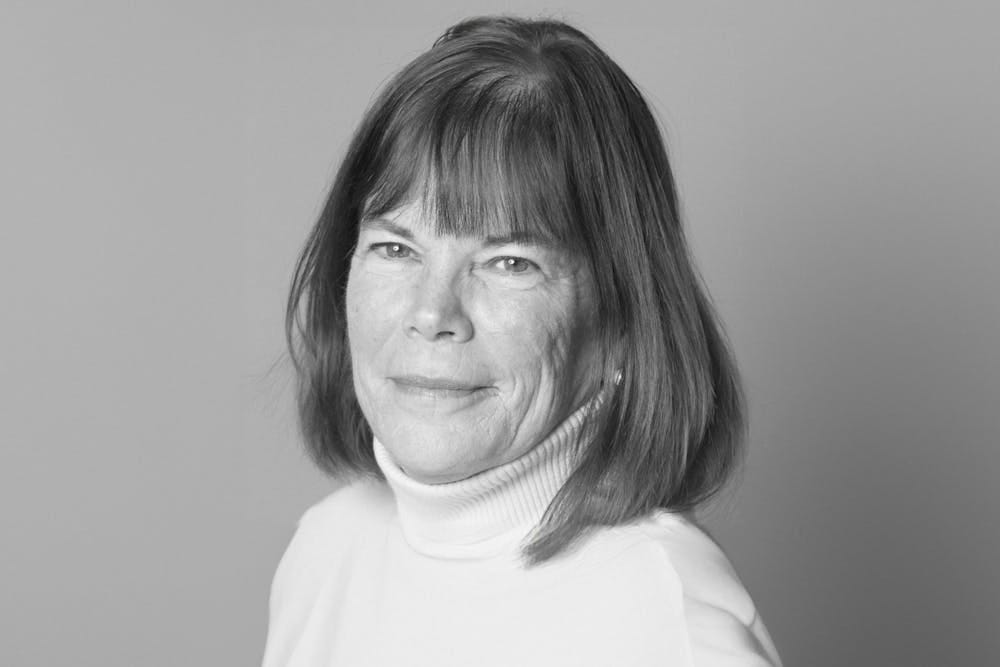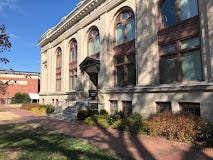Tribute to a rare person, lost too soon ...
A good teacher, good friend, and bright spirit: Dulcie Murdock Straughan
I recently attended a Zoom-facilitated Celebration of Life for an old friend from graduate school days. She was a wonderful professor who succumbed from the dreaded scourge of all bright minds: early-onset Alzheimer’s disease. The purely secular service was sad but inspiring, as those lucky enough to be there—her husband, children, and colleagues—traded memories and loving anecdotes.
I watched and held back my own tears as the years fell away, and I remembered when I first met Dulcie Murdock Straughan. We both started graduate school in the Ph.D. program at the UNC School of Journalism in January 1981. For nearly two years, she and I shared a bullpen office—along with a parade of other grad students—in the basement of shabby-chic old Howell Hall on the Chapel Hill campus. That was years before the school made its move to the Carroll Hall palace it now inhabits.
Dulcie Murdock Straughan (1949-2023), forever smiling. Photo courtesy UNC Hussman School, Daily Tar Heel
Back then we were all poor, struggling graduate students, making do on small scholarships, teaching stipends, part-time jobs. A native of Maryland’s Eastern Shore, she came down with a master’s degree from Virginia Commonwealth University. I came up from Fayetteville, leaving behind my business life while finishing up a master’s at N.C. State in political science. She was divorced; I was about to be. We both wanted to become professors. Along the way, we also became fast friends, and until her illness, stayed in regular touch.
She made it—and without even trying very hard, changed the world around her every day in ways large and small. In 1983, I left midstream and clumsily struck out for a future as a Foreign Service Officer, living around the world—like Peter Pan on steroids, recuperating from a demoralizing divorce—while she stuck it out, fell in love with my best friend and former roommate, Chris, and stayed in Chapel Hill for the rest of her life. Toward the end, she was interim dean, just before retiring in 2016.
Her hundreds of students in public relations could tell you far more about the effect she had on them—always inspiring, challenging, comforting—than I ever could. All I could tell you is how genuinely I admired her bright outlook and determination to show others the way. Dulcie was above all an authentic person—not perfect, but perfectly comfortable in her own skin. Not a mean bone in her body. She was just so much fun to be around, always smiling, enigmatically, sometimes impishly—it was contagious!—as well as a darned good bridge player.
Our basement office (far left) was in Howell Hall, the old J-School at UNC. Public domain photo
Our beloved Dean, Richard Cole, used to walk past our office and look in longingly, as he watched four of us taking a much-needed break—usually Dulcie; Wat Hopkins; our ringleader, Rich Beckman, the crafty photojournalism professor; and me, the perennial dummy. (What do you mean, seven no-trump? Thanks a lot, Rich …)
We even dated briefly, but soon found out that we were both just placeholders for each other, still looking for those great loves that had so far eluded us: she with Chris, me with Margaret, whom I would soon meet in Jamaica on my first Foreign Service posting. Fate was determined for us to be good friends, forever.
In the spring of 1982, my 15th high school reunion was held in my small hometown, Dunn, not so far from Chapel Hill—42 years ago, now—and Dulcie agreed to go with me: always up for a good time—or at least to try to make a dull time better. Thank goodness. I could not face going alone. It was tough enough explaining my newly-single status to inquisitive childhood friends, but there she was—tall, slim, good-looking, a lively companion, and a very good dancer—and even somehow made me look coordinated, which took more than a little doing.
I remember driving her up once to Athens, Ohio, where she presented a paper on some esoteric public relations subject, and we nearly got lost on those winding mountain roads in West Virginia—a state neither of us had ever been to, much less through. All I could think of was the early slasher film from my adolescence, 2,000 Maniacs (about a Brigadoon-ish town that only comes to life once a century to murder unsuspecting Yankee tourists). I was never so relieved to cross the state line into Ohio, still in daylight.
2,000 Maniacs was a “grindhouse … hicksploitation” remake of Brigadoon in 1964, according to Wikipedia.
But my uneasiness lingered. In Athens, we stayed in ground-floor rooms at a fading no-tell motel, at barely-affordable student rates, where the usual dead-bolt interior locks had been replaced with a heavy-duty nylon-rope loop bolted into the interior door jamb and twisted around the handle at night.
“So, do you think this really works?” she asked me, in deadpan style, after surveying her room’s shaky door-handle. I shook my head. “It may slow them down until they kick the door in,” I guessed. She burst into laughter, and later wedged a chair under her door handle, to slow them down even further.
That laugh still rings down the long corridors of the four decades since. Along with her infectious good humor, and her loving and generous disposition, there was another rare quality that so few teachers seem to have these days: the ability to make poor students try harder, middling students do better, and good students become their very best.
One of her colleagues told a story at the service that summed up her forever-encouraging attitude. She apparently once told her students that if they did not know the answer to a question, they would still get half-credit if they could give an answer that made her laugh. A Dulcie-ism, if there ever was one.
Or the time she traveled to Shanghai and Beijing with a team of academic experts before the 2008 Olympics, and their Chinese-speaking colleague was patiently translating their remarks into Mandarin for the local audience. She did not speak Mandarin, but he kept using a phrase that irked her, for some reason—something like “dinna,” or “dela,” as I heard it.
Dulcie turned to her seatmate and said, “What the hell was that?” And then after it was over, approached her colleague, a good friend, and only half-kidding, demanded that he explain just what he had been saying about them.
Apparently it was a nonsense syllable—sort of like “uh” or “er”—much like the Singaporeans I used to work with always added “lah” to almost every English sentence. He blushed but dutifully explained. Dulcie took off running with her new joke and gave him a permanent nickname, all in good-spirited teasing. It undoubtedly made the trip more fun—which as my Foreign Service friends will probably attest to, often takes a lot in dreary, buttoned-down Communist China. Not much for levity.
I don’t know much about the early symptoms of her terrible disease—I am not brave enough to learn, in case it comes along for me; I would rather not recognize them—but I do know that in the early stages, it is often masked in part by the clever people it often strikes. I learned about her condition from Rich, who knew I would want to know, so I could begin to grieve slowly, in advance.
I have an aunt with a similar affliction—still plays the piano like a pro at 96, with wicked energy, but cannot always recognize her own children. Once bright, witty, engaging, Tootsie is now headed down a lonely road we cannot rescue her from.
I lost another very bright friend from that same 1982 reunion—and surprisingly, able to attend the 2017 replay—to early-onset Alzheimer’s. Dollye was a math whiz, and knew then she was already struggling with words, but was stoic, and lucky to have very supportive family and friends, who stood by her, to the last moment, before she was 70.
Dulcie knew, I am sure, precisely what dark place waited at the end of her road—she was too wise and too practical not to read up on it, and far more courageous than me to the end—but like the indomitable trooper she always was, smiled and let her light go on shining until she drew her last breath in that memory unit in December. After the double curse of COVID-19. She had her loving family with her ...
In May, she would have turned 75—exactly one month before I will, in June. I used to tease her about being older. But now she, at least, is free to stay young forever—eternally smiling, and lighting all our paths with her reflected joy until we follow her into that great unknown.
Long live a beautiful, bright spirit. And all those marvelous memories she loaned us. We may now grieve openly, but thank goodness we can also still laugh, without shame …
Next time: From the sublime to the ridiculous: a dictator disappears …





Oh, Ben. How awful and incredibly sad! Your tribute brought back fond memories of those days in Howell Hall. Dulcie was indeed a very special person, full of life and grace. Hugs to you!! (As an aside, I carried the keychain you brought me from OU for many years. It was a nice reminder of my home state.)
What a beautiful tribute. I feel like I know her. You're such a natural storyteller!